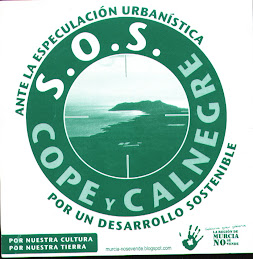Facilitamos el articulo en ingles y seguidamente traducido en Español:
Rare tortoise threatened as last of Spain's unspoiled coast falls prey to developers
By Fiona Govan in Almeria
Last Updated: 12:01am GMT 29/01/2008
It has survived wars, disease and famine, but the spread of residential tourism across its natural habitat may prove too much for the spur-thighed tortoise.
Small populations of Testudo graeca survive in only two small pockets in Spain; the national park of Doñana in Andalusia and a strip of as yet unspoiled coastline between Almeria and Murcia in the southeast.
Almeria's shoreline boasts one of the few remaining stretches of unspoiled Mediterranean coastline in Spain
But now one of the last remaining stretches of undeveloped coast on the Spanish Mediterranean is falling prey to the same kind of mass construction that has buried the Costa del Sol under a layer of concrete.
Environmentalists fear a new 5,000 acre development, that promises to be one of the largest purpose built tourist resorts in Europe, heralds the end of the protected species of tortoise.
"The development will destroy one of the last unspoiled corners of the coastline of the Murcia region - an area of incalculable environmental value - and will endanger the survival of the protected spur-thighed tortoise," said a statement from environmentalist group Ecologists in Action.
They are protesting against plans by the regional government to allow the construction of Marina de Cope, a development that when completed will include 9,000 holiday homes, hotel accommodation for 20,000 guests, five golf courses and a 2,000 berth marina.
advertisement
Jose Pablo Ruiz Abellán, the regional head of tourism for Murcia, claimed the initiative was a necessary step for the region to become an "international reference point for quality tourism".
The project near the town of Águilas controversially encompasses land that forms part of a Natural Park and was protected until the regional government introduced an amendment to allow the construction to go ahead.
"Taking steps backward in the protection of natural spaces cannot be allowed in any civilized country," claim organisers of the campaign to Save Cabo de Cope Natural Park.
Of the threat to the survival of Spain's tortoises, Ruben Vives, the Murcian regional secretary for Ecologists in Action, told Spain's El Pais newspaper: "This species' habitat is very reduced, so its ecological value is huge.
"The key to their future lies in how much habitable surface they have, and this area keeps shrinking due to land declassifications, new roads, agriculture and so on. So right now, the tendency is for them to disappear."
The construction process itself causes great harm to the reptiles with many crushed by the mechanical diggers.
Even those that survive the process are likely to face further problems. Because they are cold-blooded, slow-moving animals, a road represents a much bigger obstacle to them than to swifter and more robust animals such as deer or boar.
"When groups become isolated from the main population due to a project that cuts through their terrain, they often simply die out," said Mr Vives, underscoring that even though the EU Habitats Directive has set aside protected land for them, these areas are insufficient and unconnected.
This could mark the end of a species that, although not indigenous to Spain, has for centuries made its home here, according to Christian Wiesner, a vet and tortoise specialist who works out of the Mediterranean coast.
"This area is ideal because they are extremely well adapted to the arid climate, supporting long periods of water deprivation and food scarcity," said Mr Wiesner.
"Mediterranean tortoises have already disappeared from most of their original biotopes; almost none are left in France and Italy due to human pressure, and they can only survive in remote and sparsely populated areas. One of these important residual habitats, Águilas, is now about to be destroyed."
Esto ha sobrevivido guerras, enfermedad y hambre, pero la extensión de turismo residencial a través de su hábitat natural puede demostrar demasiado para la tortuga de espuela-thighed.
Las pequeñas poblaciones de Testudo graeca sobreviven en sólo dos pequeños bolsillos en España; el parque nacional de Doñana en Andalucía y una tira de línea de la costa aún inestropeada entre Almería y Murcia en el sudeste.
Los ecologistas temen un nuevo desarrollo de 5,000 acres, que promete ser uno del objetivo más grande recursos construidos turísticos en Europa, anuncia el final de la especie protegida de tortuga.
Ellos protestan contra proyectos por el gobierno regional para permitir que la construcción de Marina de Se adapte, un desarrollo que cuando completado incluirá 9,000 casas de veraneo, alojamiento en hotel para 20,000 invitados, cinco canchas de golf y un 2,000 puerto deportivo de litera.
El proyecto cerca de la ciudad de Águilas polémicamente abarca la tierra que forma la parte de un Parque Natural y fue protegida hasta que el gobierno regional introdujera una enmienda para permitir a la construcción para seguir adelante.
" No pueden permitir a pasos que toman hacia atrás en la protección de espacios naturales en ningún país civilizado, " demandan que los organizadores de la campaña para Salvar(Ahorrar) Cabo de Se adaptan el Parque Natural.
" La llave a su futuro miente(está) en cuanto la superficie habitable ellos tienen, y este área sigue encogiéndose debido a declasificaciones de tierra, nuevos caminos, agricultura etcétera. Tan ahora mismo, la tendencia es para ellos para desaparecer. " El proceso de construcción sí mismo causa el gran daño a los reptiles con muchos arrugados por los cavadores mecánicos.
" Cuando los grupos se hacen aislados de la población principal debido a un proyecto que corta por su terreno, ellos a menudo simplemente mueren, " dijo Sr. Vives, subrayando que aun cuando la Directiva de Hábitats de Unión Europea haya dejado la tierra protegida de lado para ellos, estas áreas son insuficientes y no relacionadas.
" Este área es ideal porque ellos sumamente bien son adaptados al clima árido, apoyando los períodos largos de privación de agua y la escasez de alimentos, " dijo Sr. Wiesner.
viernes
Marina de Cope en The Daily Telegraph. Este periódico ingles de orientación conservadora, denuncia la destrucción de Marina de Cope
TRADUCCIÓN: (Nota: la traducción se ha realizado utilizando un traductor automatico, con los consiguientes errores gramaticales).
La tortuga rara amenazada como último de la costa inestropeada de España es víctima de reveladores Por Fiona Govan en Almería Último Puesto al día: 12:01am GMT 29/01/2008
Pero ahora uno de los últimos períodos restantes de costa sin explotar sobre Mediterráneo español es víctima de la misma clase de construcción de masas que ha enterrado a Costa del el Sol bajo una capa de hormigón.
" El desarrollo destruirá una de las últimas esquinas inestropeadas de la línea de la costa de la región de Murcia - un área de valor incalculable ambiental - y pondrá en peligro la supervivencia de la tortuga de espuela-thighed protegida, " dijo una declaración de Ecologistas de grupo de ecologista en la Acción.
Jose Pablo Ruiz Abellán, el jefe regional del turismo para Murcia, demandó que la iniciativa era un paso necesario para la región para hacerse " un punto de referencia internacional para el turismo de calidad ".
De la amenaza a la supervivencia de las tortugas de España, Ruben Vives, el secretario Murcian regional para Ecologistas en Acción, el periódico el-Pais de España dicha: " Muy reducen(obligan) el hábitat de esta especie, entonces su valor ecológico es enorme.
Incluso aquellos que sobreviven el proceso probablemente afrontan remotos problemas. Como ellos son animales de sangre fría, lentos, un camino les representa un obstáculo mucho más grande que a animales más rápidos y más robustos como el ciervo o el verraco.
Esto podría marcar el final de una especie que, aunque no indígena a España, tiene durante siglos hizo su casa aquí, según Christian Wiesner, un veterano(veterinario) y el especialista de tortuga que trabaja de la costa mediterránea.
"Mediterranean tortoises have already disappeared from most of their original biotopes; almost none are left in France and Italy due to human pressure, and they can only survive in remote and sparsely populated areas. One of these important residual habitats, Águilas, is now about to be destroyed."
Publicado por
caravacacampoyciudad
en
1:27 a. m.
![]()
Suscribirse a:
Enviar comentarios (Atom)






0 comentarios:
Publicar un comentario